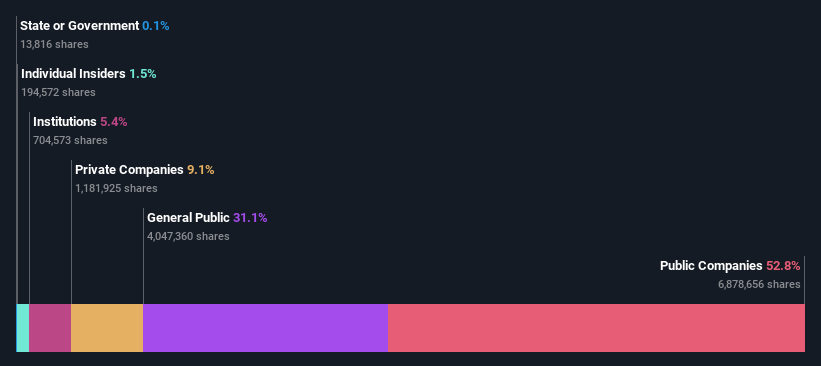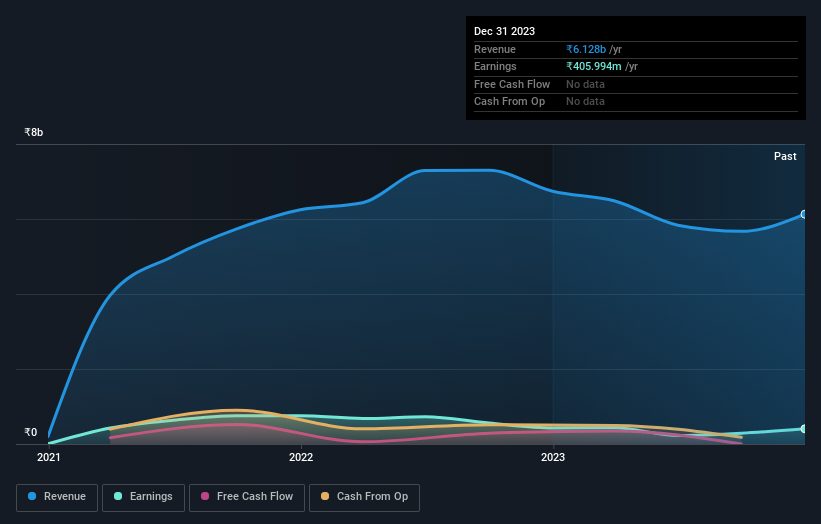Fairchem Organics Limited's (NSE:FAIRCHEMOR) biggest owners are public companies who got richer after stock soared 11% last week

Key Insights
- The considerable ownership by public companies in Fairchem Organics indicates that they collectively have a greater say in management and business strategy
- The largest shareholder of the company is Fairfax India Holdings Corporation with a 53% stake
- Using data from company's past performance alongside ownership research, one can better assess the future performance of a company
To get a sense of who is truly in control of Fairchem Organics Limited (NSE:FAIRCHEMOR), it is important to understand the ownership structure of the business. With 53% stake, public companies possess the maximum shares in the company. Put another way, the group faces the maximum upside potential (or downside risk).
As a result, public companies collectively scored the highest last week as the company hit ₹18b market cap following a 11% gain in the stock.
Let's take a closer look to see what the different types of shareholders can tell us about Fairchem Organics.
See our latest analysis for Fairchem Organics

What Does The Institutional Ownership Tell Us About Fairchem Organics?
Many institutions measure their performance against an index that approximates the local market. So they usually pay more attention to companies that are included in major indices.
As you can see, institutional investors have a fair amount of stake in Fairchem Organics. This suggests some credibility amongst professional investors. But we can't rely on that fact alone since institutions make bad investments sometimes, just like everyone does. When multiple institutions own a stock, there's always a risk that they are in a 'crowded trade'. When such a trade goes wrong, multiple parties may compete to sell stock fast. This risk is higher in a company without a history of growth. You can see Fairchem Organics' historic earnings and revenue below, but keep in mind there's always more to the story.

We note that hedge funds don't have a meaningful investment in Fairchem Organics. The company's largest shareholder is Fairfax India Holdings Corporation, with ownership of 53%. This essentially means that they have extensive influence, if not outright control, over the future of the corporation. In comparison, the second and third largest shareholders hold about 3.4% and 3.2% of the stock.
Researching institutional ownership is a good way to gauge and filter a stock's expected performance. The same can be achieved by studying analyst sentiments. Our information suggests that there isn't any analyst coverage of the stock, so it is probably little known.
Insider Ownership Of Fairchem Organics
While the precise definition of an insider can be subjective, almost everyone considers board members to be insiders. Management ultimately answers to the board. However, it is not uncommon for managers to be executive board members, especially if they are a founder or the CEO.
I generally consider insider ownership to be a good thing. However, on some occasions it makes it more difficult for other shareholders to hold the board accountable for decisions.
We can see that insiders own shares in Fairchem Organics Limited. As individuals, the insiders collectively own ₹266m worth of the ₹18b company. Some would say this shows alignment of interests between shareholders and the board. But it might be worth checking if those insiders have been selling.
General Public Ownership
The general public-- including retail investors -- own 31% stake in the company, and hence can't easily be ignored. This size of ownership, while considerable, may not be enough to change company policy if the decision is not in sync with other large shareholders.
Private Company Ownership
We can see that Private Companies own 9.1%, of the shares on issue. It might be worth looking deeper into this. If related parties, such as insiders, have an interest in one of these private companies, that should be disclosed in the annual report. Private companies may also have a strategic interest in the company.
Public Company Ownership
It appears to us that public companies own 53% of Fairchem Organics. This may be a strategic interest and the two companies may have related business interests. It could be that they have de-merged. This holding is probably worth investigating further.
Next Steps:
I find it very interesting to look at who exactly owns a company. But to truly gain insight, we need to consider other information, too. To that end, you should learn about the 2 warning signs we've spotted with Fairchem Organics (including 1 which shouldn't be ignored) .
Of course this may not be the best stock to buy. So take a peek at this free free list of interesting companies.
NB: Figures in this article are calculated using data from the last twelve months, which refer to the 12-month period ending on the last date of the month the financial statement is dated. This may not be consistent with full year annual report figures.
New: AI Stock Screener & Alerts
Our new AI Stock Screener scans the market every day to uncover opportunities.
• Dividend Powerhouses (3%+ Yield)
• Undervalued Small Caps with Insider Buying
• High growth Tech and AI Companies
Or build your own from over 50 metrics.
Have feedback on this article? Concerned about the content? Get in touch with us directly. Alternatively, email editorial-team (at) simplywallst.com.
This article by Simply Wall St is general in nature. We provide commentary based on historical data and analyst forecasts only using an unbiased methodology and our articles are not intended to be financial advice. It does not constitute a recommendation to buy or sell any stock, and does not take account of your objectives, or your financial situation. We aim to bring you long-term focused analysis driven by fundamental data. Note that our analysis may not factor in the latest price-sensitive company announcements or qualitative material. Simply Wall St has no position in any stocks mentioned.
About NSEI:FAIRCHEMOR
Fairchem Organics
Manufactures and sells specialty oleo chemicals and intermediate nutraceuticals in India, East Asia, the Middle East, North America, and internationally.
Excellent balance sheet low.
Similar Companies
Market Insights
Community Narratives




